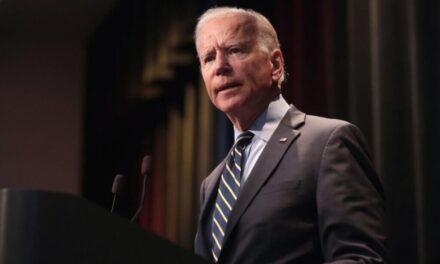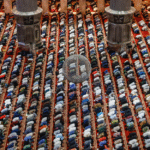Israeli army tanks deploy into the Gaza Strip on May 20, 2025 amid the ongoing genocide. (Photo: © Saeed Qaq/ZUMA Press Wire/ZUMA Wire/ APA Images)
The UN Special Rapporteur on the situation of human rights in the Palestinian territories occupied since 1967, Francesca Albanese, issued a seminal report on June 30, titled “From economy of occupation to economy of genocide.” It focuses on the economic interests benefiting from the current genocide in Gaza.
While the report itself names a lot of names, from states to corporations, banks, and universities, Albanese concludes, “the entities named in the present report constitute a fraction of a much deeper structure of corporate involvement, profiteering from and enabling violations and crimes in the occupied Palestinian territory.”
The report comes on the heels of two other major reports by Albanese last year: the “Anatomy of a Genocide” from March 2024 and the “Genocide as Colonial Erasure” in October 2024. In the latter, Albanese identified how Israel was expanding its genocide from Gaza to the West Bank.
Her analysis holds that there are three main elements of Israel’s colonialist takeover: displacement, replacement, and erasure. Genocide is the most extreme form of erasure, but it is a part of the larger eliminationist logic within a broader plan of “colonial erasure.”
Given her mandate on territories occupied since 1967, that is where Albanese focuses her analysis. The Israeli occupation since 1967 has had broad economic support, particularly from the corporate world, and these actors have mostly continued that support as Israel has moved to its next stage of colonial erasure: Genocide.
The focus of this report is to show how corporations have enabled the displacement, replacement, and erasure of Palestinian life, exposing “the integration of the economies of settler-colonial occupation and genocide.” The report finishes with a stirring call to action. In Albanese’s words, “Commercial endeavours enabling and profiting from the obliteration of innocent people’s lives must cease. Corporate entities must refuse to be complicit in human rights violations and international crimes or be held to account.”

Displacement
The economic actors facilitating displacement are mostly companies that are involved with heavy equipment, weapons, and tech surveillance. There is a myriad of actors, directly or through subsidiaries.
For example, Caterpillar is a well-known example with its deep collaboration with Israeli weapons manufacturers and military:
“For decades, Caterpillar Inc. has provided Israel with equipment used to demolish Palestinian homes and infrastructure, through both the United States Foreign Military Financing programme and an exclusive licensee requisitioned by Israeli law into the military. In partnership with companies such as Israel Aerospace Industries, Elbit Systems and Leonardo DRS, Inc.-owned RADA Electronic Industries, Israel has evolved Caterpillar’s D9 bulldozer into automated, remote-commanded core weaponry of the military, deployed in almost every military activity since 2000, clearing incursion lines, “neutralizing” the territory and killing Palestinians.”
This has placed Caterpillar at the center of genocide in Gaza:
“Since October 2023, Caterpillar equipment has been documented as being used to carry out mass demolitions – including of homes, mosques and life-sustaining infrastructure – raid hospitals and burying alive wounded Palestinians. In 2025, Caterpillar secured a further multi-million dollar contract with Israel.”
But there are many other examples in this industry as well:
“The Korean HD Hyundai and its partially owned subsidiary, Doosan, alongside the Swedish Volvo Group and other major heavy machinery manufacturers, have long been linked to the destruction of Palestinian property, each supplying equipment through exclusively licensed Israeli dealers. Volvo’s licensee is an OHCHR database-listed company [UN database lists business enterprises that have “directly and indirectly enabled, facilitated and profited from the construction and growth of the settlements”] and together they own Merkavim Transportation Technologies Ltd., which produces armoured buses sold to service colonies. Since at least 2007, Volvo machinery has been used to raze Palestinian areas, including in East Jerusalem and Masafer Yatta. For over a decade, HD Hyundai machinery has been used to demolish Palestinian homes and raze farmland, including olive groves.”
And these become tools of genocide:
“After October 2023, Israel increased the use of the equipment of those companies in the urban destruction of Gaza, including in flattening Rafah and Jabalia, after which the military obscured their logos.”
Military tech surveillance is a big part of the Israeli colonialist displacement regime. Israeli companies such as the NSO Group have built a global market for their surveillance technology, but the report also names several well-known international corporations and outlines their roles in supporting Palestinian displacement. These include IBM, Hewlett-Packard, Microsoft, Google, Amazon, and Palantir.
Replacement
Once Israel displaces Palestinians, a wide array of businesses support the consolidation of its control through the creation and maintenance of Israeli colonies: construction, raw materials (often pillaged from occupied territory), agribusiness, tourism, etc. Here, there are also many international actors that facilitate the normalization of Israel’s displacement and theft:
“More than 371 colonies and illegal outposts have been built, powered and traded with by companies facilitating the replacement by Israel of the Indigenous population in the occupied Palestinian territory. In 2024, this intensified after the administration of colonies moved from the military to the civilian Government and the Ministry of Construction and Housing budget doubled, with $200 million allotted for colony construction. From November 2023 to October 2024, Israel established 57 new colonies and outposts, with Israeli and international companies supplying machinery, raw materials and logistical support”.
While the same heavy machinery providers reappear (Caterpillar, HD Hyundai, Volvo), other actors provide raw materials:
“The German Heidelberg Materials AG, through its subsidiary Hanson Israel, has contributed to the pillage of millions of tons of dolomite rock from the Nahal Raba quarry on land seized from Palestinian villages in the West Bank. In 2018, Hanson Israel won a public tender to supply materials from that quarry for colony construction, and has since nearly exhausted the quarry, prompting ongoing expansion requests.”
Transport:
“Various companies contributed to developing roads and public transport infrastructure critical to establishing and expanding the colonies, and connecting them to Israel while excluding and segregating Palestinians. The Spanish/Basque Construcciones Auxiliar de Ferrocarriles joined a consortium with a OHCHR database-listed company to maintain and expand the Jerusalem Light Rail Red Line and build the new Green Line, at a time when other companies had withdrawn owing to international pressure. These lines include 27 kilometres of new tracks and 50 new stations in the West Bank, connecting colonies with West Jerusalem. Doosan and Volvo excavators and machinery have been used, and Heidelberg’s subsidiary supplied materials for a light-rail bridge.”
Real estate:
“Real estate companies sell properties in colonies to Israeli and international buyers. The global real estate group, Keller Williams Realty LLC, through its Israeli franchisee KW Israel, has had branches based in the colonies. In March 2024, Keller Williams, through another franchisee, Home in Israel, ran a real estate roadshow in Canada and the United States, jointly sponsored with several companies developing and marketing thousands of apartments in colonies.”
And then there is “occupation tourism”, which brings in the online services, Booking.com and Airbnb:
“Major online travel platforms, used by millions to reserve accommodation, profit from the occupation by selling tourism that sustains the colonies, excludes Palestinians, promotes settler narratives and legitimizes annexation. Booking Holdings Inc. and Airbnb, Inc. list properties and hotel rooms in Israeli colonies. Booking.com has more than doubled its listings in the West Bank – from 26 in 2018 to 70 by May 2023 – and tripled its East Jerusalem listings to 39 in the year post October 2023. Airbnb has also amplified its colonial profiteering, growing from 139 listings in 2016 to 350 in 2025, collecting up to 23 per cent commission. These listings are linked with restricting Palestinian access to land and endangering nearby villages. In Tekoa, Airbnb enables settler promotion of a “warm and loving community”, whitewashing settler violence against the neighbouring Palestinian village of Tuqu‘.”
The enablers
There is an entire interconnected network of companies, institutions, and interests that weave together to support and profit from the Israeli occupation. The entities are all enabling Israel’s illegality, and Albanese breaks them down by sector.
Banking and Insurance
War crimes and crimes against humanity are a risky business in general. Investing in a country that creates so much turmoil is counterintuitive for many, and many investors have bailed out of the high-tech industry, for example. That’s why financial giants are important to secure that investments in the war machine keep flowing.
Albanese explains how the world’s largest banks give Israel financial cover as it carries out genocide.
Albanese:
“Some of the world’s largest banks, including BNP Paribas and Barclays, stepped in to boost market confidence by underwriting these international and domestic treasury bonds, allowing Israel to contain the interest rate premium, despite a credit downgrade. Asset management firms – including Blackrock ($68 million), Vanguard ($546 million) and Allianz’s asset management subsidiary PIMCO ($960 million) – were among at least 400 investors from 36 countries who purchased them. Meanwhile, the Development Corporation for Israel (i.e., Israel Bonds) provides a bond solicitation service for the Government of Israel for overseas private individuals and other investors. The Development Corporation for Israel tripled its annual bond sales to funnel nearly $5 billion to Israel since October 2023, while offering investors the option of sending the return on bond investments to charitable organizations supporting the Israeli military and the colonies.”
Insurance companies then buttress this:
“Global insurance companies, including [German] Allianz and AXA, also invest large sums in shares and bonds implicated in the occupation and genocide, partly as capital reserves for policyholder claims and regulatory requirements, but primarily to generate returns. Allianz holds at least $7.3 billion and AXA, despite some divestment decisions, still invests at least $4.09 billion in tracked companies named in the present report. Their insurance policies also underwrite the risks other companies necessarily take when operating in Israel and the occupied Palestinian territory, thus enabling the commission of human rights abuses and “de-risking” the operational environment.”
And pension funds are involved in this too, including Norwegian and Canadian ones:
“Sovereign wealth and pension funds are also significant financiers. The world’s largest sovereign wealth fund, the Norwegian Government Pension Fund, claims it has the world’s most comprehensive ethical guidelines. After October 2023, the Fund increased its investment in Israeli companies by 32 per cent to $1.9 billion. By the end of 2024, the Fund had $121.5 billion – 6.9 per cent of its total value – invested in companies named in the present report alone. The Caisse de dépôt et placement du Québec, which manages Can$ 473.3 billion ($328.9 billion) in pension funds for six million Canadians, has almost Can$ 9.6 billion ($6.67 billion) invested in companies named in the present report, despite its sustainable investment policy and human rights policy. From 2023 to 2024, it almost tripled investment in Lockheed Martin, quadrupled investment in Caterpillar and increased 10-fold the investment in HD Hyundai.”
Academia
But the enablers are not just financial institutions. Albanese shows how academia has also played a crucial role.
The most prestigious academic institutions are tied to Israel. Like MIT:
“Leading universities, especially from global-minority countries, partner with Israeli institutions in areas directly harming Palestinians. At the Massachusetts Institute of Technology, labs conduct weapons and surveillance research funded by the Israeli Ministry of Defense – the only foreign military financing research at the Institute. Notable Israeli Ministry of Defense projects include drone swarm control – a distinct feature of the Israeli assault on Gaza since October 2023 – pursuit algorithms and underwater surveillance. From 2019 to 2024, the Institute managed a Lockheed Martin seed fund connecting students to teams in Israel. From 2017 to 2025, Elbit Systems paid for membership to the Institute’s Industrial Liaison Program, enabling access to research and talent.”
Huge EU academic projects are involved:
“The European Commission’s Horizon Europe programme actively facilitates collaboration with Israeli institutions, including those complicit in apartheid and genocide. Since 2014, the European Commission has granted over €2.12 billion ($2.4 billion) to Israeli entities, including the Ministry of Defense, while European academic institutions both benefit from and reinforce this entanglement. The Technical University of Munich receives €198.5 million ($218 million) in EC Horizon funding, including €11.47 million ($12.6 million) for 22 collaborations with Israeli partners, military and tech firms. The University and Israel Aerospace Industries receive €792,795.75 ($868,416) to jointly develop, with other participants, green hydrogen refuelling, technology relevant to Israel Aerospace Industries military drones used in Gaza. The University partners with IBM Israel – which runs the discriminatory Israeli Population Registry – on cloud and artificial intelligence systems, as part of the €7.75 million ($8.52 million) IBM Israel receives in Horizon funding. The University also collaborates on a €10.76 million ($11.71 million) project on “seamless shared urban mobility” that includes the Municipality of Jerusalem, a city entrenching annexation through urban transportation.”
Agribusiness
Agribusiness has often been seen as a trademark of Israel’s innovation, but it is inextricably connected to Israel’s occupation. “Agribusiness has thrived on Israel-led extractivism and land-grabbing – producing goods and technologies serving Israeli settler-colonial interests, expanding market dominance and attracting global investment – while erasing Palestinian food systems and accelerating displacement,” Albanese writes.
She names the Israeli food giant Tnuva, and the watering giant Netafim:
“Tnuva, the largest food conglomerate in Israel, now majority-owned by the Chinese Bright Food (Group) Co., Ltd., has fueled and benefited from land dispossession. Tnuva’s Chairman recognized that “agriculture … in general and dairy farming in particular are a strategic resource and a significant pillar in the settlement enterprise”. Israel has used kibbutzim and agricultural outposts to seize Palestinian land and replace Palestinians. Companies like Tnuva help by sourcing products from these colonies, then exploit the resulting captive Palestinian market to build market dominance… Netafim, a global leader in drip irrigation technology, now 80 per cent owned by the Mexican company Orbia Advance Corporation, has designed its agritech in concert with the expansion imperatives of Israel. While maintaining a global image of sustainability, Netafim technology has enabled intensive exploitation of water and land in the West Bank, further depleting Palestinian natural resources, while being refined through collaboration with Israeli military-technology firms. In the Jordan Valley, Netafim-aided irrigation systems have facilitated Israeli crop expansion, while Palestinian farmers – denied water and with 93 per cent unirrigated land – are pushed out, unable to compete with Israeli production. Furthermore, such irrigation techniques threaten to exhaust the Jordan River and Dead Sea.”
Logistics
Shipping giants like the Danish Mærsk then ship the goods:
“Global logistics giants like A.P. Moller – Maersk A/S are integral to this ecosystem; for years they have shipped goods from the colonies and OHCHR database-listed companies straight to the United States and other markets.”
And Mærsk is involved in much more than just shipping avocados:
“Shipping companies such as the Danish A.P. Moller – Maersk A/S transport components, parts, weapons and raw materials, sustaining a steady flow of United States-supplied military equipment post October 2023.”
Energy
Those who supply Israel with energy, inevitably supply what Israel is doing – not just its colonization, but also its genocide. A lot of world actors are involved here:
“Coal for electricity to Israel originates primarily from Colombia (60 per cent of Israeli coal imports in 2023-24); United States-headquartered Drummond Company, Inc. and the Swiss-based Glencore PLC are the primary suppliers. Their respective subsidiaries own the mines and the three ports involved in the delivery of 15 coal shipments to Israel since October 2023, including six shipments after Colombia suspended coal exports to Israel in August 2024. Glencore was also involved in shipments from South Africa; these shipments accounted for 15 per cent of Israeli coal imports in 2023 and 2024.”
This is taking place while Israel pillages Palestinian natural resources:
“The United States Chevron Corporation, in consortium with Israeli NewMed Energy (a subsidiary of the OHCHR database-listed Delek Group), extracts natural gas from the Leviathan and Tamar fields; it paid the Government of Israel $453 million in royalties and taxes in 2023. Chevron’s consortium supplies more than 70 per cent of Israeli energy consumption. Chevron also profits from its part-ownership of the East Mediterranean Gas pipeline, which passes through Palestinian maritime territory, and from gas export sales to Egypt and Jordan. The Gaza naval blockade is connected to Israel securing the Tamar gas supply and the East Mediterranean Gas pipeline. At a time of increasing brutality, the British company BP PLC is expanding involvement in the Israeli economy, with exploration licences confirmed in March 2025, which allow BP to explore Palestinian maritime expanses illegally exploited by Israel.”
Much more than the military industry
While all these sectors of industry help contribute to and enable the Israeli occupation in one way or another, it cannot be forgotten that the Israeli military and weapons industry are a primary vehicle for and beneficiary of Israel’s military aggression and genocide.
Albanese naturally has a section focused on the military sector, titled “Military sector – the business of elimination,” which shows how its military industry serves a major national and international economic interest.
Albanese explains:
“The military-industrial complex has become the economic backbone of the State. Between 2020 and 2024, Israel was the eighth-largest arms exporter worldwide. The two most prominent Israeli weapons companies – Elbit Systems, established as a public-private partnership and later privatized, and State-owned Israel Aerospace Industries – are among the top 50 arms manufacturers globally.”
And there’s the cooperation with the U.S., which has culminated in the F-35 jet program, a massive international effort:
“Israel benefits from the largest-ever defence procurement programme – for the F-35 fighter jet, led by United States-based Lockheed Martin, alongside at least 1,650 other companies, including Italian manufacturer Leonardo S.p.A, and eight States… Post-October 2023, F-35s and F-16s have been integral to equipping Israel with the unprecedented aerial power to drop an estimated 85,000 tons of bombs, much of it unguided, to kill and injure more than 179,411 Palestinians and obliterate Gaza.”
There are also the Elbit drones, which is also the product of international collaboration:
“Suppliers such as the Japanese FANUC Corporation provide robotic machinery for weapons production lines, including for Israel Aerospace Industries, Elbit Systems and Lockheed Martin”.
And shipping, of course, so once again Mærsk:
“Shipping companies such as the Danish A.P. Moller – Maersk A/S transport components, parts, weapons and raw materials, sustaining a steady flow of United States-supplied military equipment post October 2023.”
So while there is the raw military industry, which people obviously associate with the worst of the attacks against Palestinians – but there is so much more to Israel’s apparatus of control over Palestine and Palestinians. It is so enormous and so globally interconnected that it would be hard to find a person in this world who doesn’t know at least one of the corporations involved.
Our responsibility
Albanese concludes with her recommendations for states, corporations, the ICC, and the UN. For corporations, this is to “cease all business activities and terminate relationships directly linked with, contributing to and causing human rights violations and international crimes against the Palestinian people” and to pay reparations to the Palestinian people. She offers the example of an apartheid wealth tax along the lines of post-apartheid South Africa.
For states and international bodies, such as the ICC and UN, Albanese calls on them to enforce the accountability mechanisms at their disposal, not only on Israel, but on the corporations who are enabling its illegal action. In addition, she called on states to impose sanctions and a full arms embargo on Israel.
And then finally, she has a call to action for us in civil society:
“The Special Rapporteur urges trade unions, lawyers, civil society and ordinary citizens to press for boycotts, divestments, sanctions, justice for Palestine and accountability at the international and domestic levels; together, the people of the world can end these unspeakable crimes.”
Albanese outlines a worldwide network of collaboration that enables Israel’s genocide in one way or another. It is overwhelming to consider, and some may be daunted by its enormity, but it is not an invincible system. It operates on elements that are very mundane: resources and money. It is dependent on an economic network and on global consent. And here lies the key to dismantling it.
Albanese ends:
“The complicity exposed by the report is just the tip of the iceberg; ending it will not happen without holding the private sector accountable, including its executives. International law recognizes varying degrees of responsibility – each requiring scrutiny and accountability, particularly in this case, where a people’s self-determination and very existence are at stake. This is a necessary step to end the genocide and dismantle the global system that has allowed it.”














